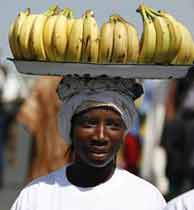Experts call for action to fight two infections that could lead to food shortages for many people in sub-Saharan countries.
This is the VOA Special English Development Report.

Two separate diseases are destroying banana and plantain crops in Africa. They could threaten food security for millions of Africans who depend on bananas as an important part of their diet.
Banana bacterial wilt was first reported in Ethiopia in the late 1960s. In 2001 it was found in Uganda. Since then it has spread to neighboring countries including Kenya, Rwanda, Tanzania and the Democratic Republic of Congo.
The leaves of infected plants weaken and become yellow. They also leak a yellow liquid. The bananas ripen too quickly and begin to rot.
Farmers can unknowingly spread the infection with their cutting tools. Experts say by the time a farmer discovers that something is wrong, it is already too late. The crop must be destroyed.
Uganda is Africa's leading producer and consumer of bananas. The organization Biodiversity International reports losses of up to 80 percent in heavily affected areas of the country.
Farmers worry that a second disease could also spread to Uganda. Bunchy top disease causes all of the leaves to grow from the top of the banana plant. Infected plants produce small, abnormal fruit. Finally, they stop producing completely.
The International Institute for Tropical Agriculture says the disease is widely found in Gabon, Angola, Malawi, and the Democratic Republic of Congo.
The institute's Rachid Hanna says farmers must destroy infected plants, normally by burning them. Bunchy top disease can spread from plant to plant and is also spread by aphids. These small insects must be destroyed. Rachid Hanna advises farmers to use biological controls such as natural enemies of the aphids.
He says bunchy top disease and banana bacterial wilt can both affect entire plantations. Not only are farm incomes affected, but so are local food supplies. Experts say more than 30 million people could be at risk of shortages unless a solution is found.
Scientists from around the world met in Tanzania last month to discuss the situation. Rachid Hanna says strong measures must be taken now to prevent a crisis in the future.
RACHID HANNA: "What is necessary in this case is a collective effort, not only by the researchers and the people on the ground, but also the donor community, because controlling those two diseases can go a long way in improving people's food security and livelihoods in Sub-Saharan Africa."
And that's the VOA Special English Development Report, written by June Simms. I'm Steve Ember.
aphid: also known as greenfly, blackfly or plant lice, are minute plant-feeding insects in the superfamily Aphidoidea in the homopterous division of the order Hemiptera 蚜蟲
Related stories:
Risk to a popular banana shows need to grow other kinds
In Afghanistan, preparing for a threat to wheat plants
Building a windbreak to protect crops
Fighting witchweed in African sorghum
(Source: VOA 英語點津編輯)